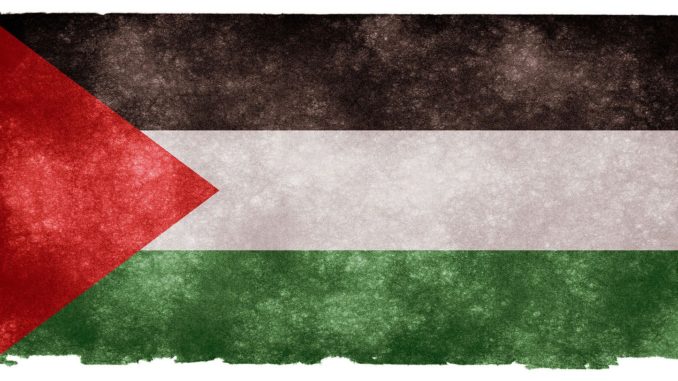
Yesterday, as the United States officially opened its embassy in Jerusalem, some 35,000 Palestinians protested along the Gaza Strip’s border with Israel. The Washington Post quoted one protester, Yousef Abu Saleh, who explained, “The American administration is adopting the Israeli story and stealing our right of return.”
The reference to the “Israeli story” concerns Israel’s right to exist that had been recognized in the partition plan recommended by the United Nations Special Committee on Palestine (UNSCOP) on September 3, 1947. The “right to return” reflects a Palestinian demand that all Palestinian Arab refugees and their descendants from all Arab-Israeli wars be permitted to move to Israel. Such a development would immediately transform Israel into a Jewish minority state. The new Palestinian majority could then use Israel’s democratic institutions to bring an end to Israel’s existence.
At the time UNSCOP was charged with bringing sovereignty to the Palestine region, a deepening low-level ethnic conflict was raging between the area’s Jewish and Arab populations. The Arab Higher Committee refused to cooperate with UNSCOP, insisting that the Arabs should inherit the entire territory. The Jewish Agency for Palestine made a strategic decision to work with UNSCOP. UNSCOP concluded that partition was the only viable solution. Its report explained:
The basic premise underlying the partition proposal is that the claims to Palestine of the Arabs and Jews, both possessing validity, are irreconcilable, and that among all of the solutions advanced, partition will provide the most realistic and practicable settlement, and is the most likely to afford a workable basis for meeting in part the claims and national aspirations of both parties… It is a fact that both of these peoples have their historic roots in Palestine, and that both make vital contributions to the economic and cultural life of the country… The basic conflict in Palestine is a clash of two intense nationalisms… Only by means of partition can these conflicting national aspirations find substantial expression and qualify both peoples to take their places as independent nations in the international community and in the United Nations.
Immediately following the UN General Assembly’s November 29, 1947 vote to adopt UNSCOP’s recommendation, Dr. Abba Hillel Silver, chairman of the American section of the Jewish Agency stated, “We extend a hand of genuine friendship to the new Arab state which is to be established in Palestine.” He called on the Arab countries “to join with us in an era of peaceful and fruitful collaboration.” The Arab leadership rejected the outcome. “Today’s resolution destroys the [UN] Charter and all previous covenants,” Saudi Arabia’s Emir Feisal al-Saud said, describing the Arab League’s position. Other Arab representatives warned of imminent war.
On May 14, 1948, the Jewish leadership declared Israel’s rebirth as a sovereign state. In response, Arab armies launched an invasion. The newly re-established Jewish state prevailed in that war. Over the next quarter century, Israel would fend off repeated efforts to conquer it. Israel would also have to deal with waves of terrorist attacks carried out against its civilians.
Unlike with Egypt and Jordan, both of which concluded peace agreements with Israel that hold to this day, the Palestinians lacked leaders who were sufficiently dedicated to the pursuit of peace. As a result, Palestinian leaders have repeatedly failed to seize historic opportunities for peace. In 2001, Yasser Arafat rejected a generous peace plan that would have given the Palestinians approximately 97% of the West Bank (inclusive of land swaps), all of the Gaza Strip, much of East Jerusalem, and a $30 billion-$40 billion refugee fund in exchange for accepting Israel’s existence and restricting Palestinian return to the new Palestinian state. In his autobiography, My Life, former President Bill Clinton explained:
I knew the plan was tough for both parties, but it was time—past time—to put up or shut up. The Palestinians would give up the absolute right of return; they had always known they would have to, but they never wanted to admit it. The Israelis would give up East Jerusalem and parts of the Old City, but their religious and cultural sites would be preserved; if had been evident for some time that for peace to come, they would have to do that… And they would get a formal end to the conflict. It was a hard deal, but if they wanted peace, I thought it was fair to both sides…
When Arafat came to see me, he asked a lot of questions about my proposal… When he left, I still had no idea what Arafat was going to do. His body language said no, but the deal was so good I couldn’t believe anyone would be foolish enough to let it go…
Arafat’s rejection of my proposal after Barak accepted it was an error of historic proportions.
In 2008, Prime Minister Olmert made a proposal that was almost identical to the Clinton parameters. Palestinian President Mahoud Abbas rejected it, because it did not create a “right of return” to Israel for Palestinian refugees and their descendants.
Today’s protests reflect that the implacable attitude that led to war in 1948 persists among the Palestinian leadership and many Palestinians. That perspective remains the largest obstacle to peace between Israel and the Palestinians. Perhaps without the kind of heroic leadership displayed by, among others, Egypt’s Anwar Sadat, Israel’s Menachem Begin, and Jordan’s King Hussein, the historic dispute will remain unresolved and its tragic costs will continue to mount.
Feature Image By Nicolas Raymond
